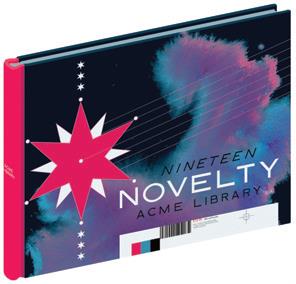If you’re a guy who’s made a career of loneliness— the loneliness of the timid, the parentally neglected, the one-legged, the hoarders of action figures and slights real or perceived—you could do worse than set a book on Mars. All those blank, reddish vistas, and the chance to rework a classic romantic rebuff: “not if you were the last guy on…”
And so Chris Ware opens volume 19 of his remarkable Acme Novelty Library comics with the narrator and his girl, just possibly the only two humans left in the whole universe, giving each other the silent treatment. Backstory: The narrator didn’t care for how much time the girl was spending with the other couple in their camp, and Martian isolation could get to anyone, mentally speaking. Also, food became scarce, and the settlement dogs were prodigious breeders, and the narrator’s something of a problem solver.
Thus: human and animal dismemberment—both, mercifully, occurring during strange gaps in the narrative. This might seem like a departure for Ware (self-criticism, self-hatred, lethargy, and depression are Ware’s standard forms of violence—the human brain attacking itself, then wallowing in the aftertaste), but it turns out this was all a story written by the depressed, etc., W. K. Brown, father to Rusty, the protagonist of volumes 16 and 17.
The balance of volume 19 gives us W. K.’s volatile first relationship, the inspiration for his Martian epic. In a supreme example of Ware’s narrative chops, a single page composed of 176 tiny frames plus a text box dismantles W. K.’s existence; it’s one of the most painful depictions of a wickedly unbalanced sexual relationship I’ve ever seen.
But what’s the deal with those gaps?
They are, for one, part of a preoccupation with memory that has only grown more complex and multifarious since the temporal deformations of Ware’s masterpiece, Jimmy Corrigan. (Loneliness without memory, after all, is hardly loneliness at all.) And there’s this: W. K. is capable of dreaming up some monstrous perversities, but he can’t conceive of a mental process commensurate with his narrator’s madness—so we’re left with a minefield of lacunae where the most desperate violence would otherwise be.
This minefield is one logical endpoint of a method Ware’s been experimenting with for years. The puzzled, self-critical, and relatively uninflected retrospective voice we find in the earlier Rusty volumes and in Ware’s other new series, Building Stories, as well as in parts of Jimmy Corrigan, has never been up to the task of capturing the inner lives of his characters. The almost unbearable poignancy of his work comes in large part from the contrast between the much-vaunted acuity and sophistication of its visual design and the fumbling simplicity of its voice. Ware has said that his style is an attempt to capture the way adults experience and categorize the world. The idea that we read the world like comics, and specifically like a Chris Ware comic, is a provocative one: if the clean lines framing Ware’s panels are not simply limits on a messy reality, but living replications of your standard postindustrial American eye-brain process, it’s bleak news for us all that when W. K. tries, at book’s end, to truly see himself, he does so via a willful act of self-blinding. Let’s just say this book ends in a solitary downer reverse-version of the end of City Lights. It’s a serious gut-punch. And while meaning may be hard to pin down here, it sure feels lonely.





